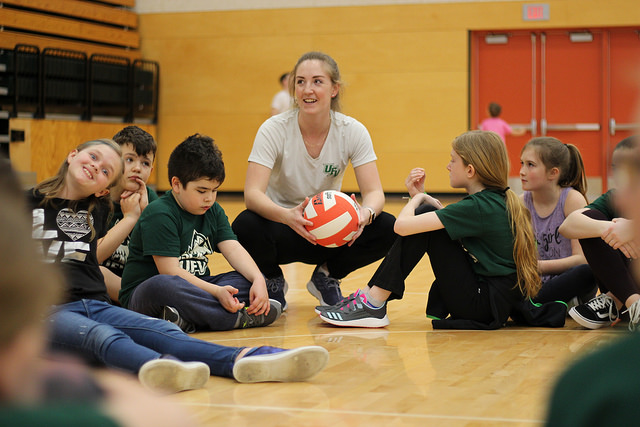Physical literacy is a journey throughout the life course. At every turn, we are learning how to move with more confidence and creativity. As young children, we learn how to balance our bodies, crawl, walk, and eventually this knowledge evolves into everyday actions necessary for movement as we develop. Learning how to balance at a young age, for example, may prevent a fall later in life or help us reach an item on a high shelf. This motivation and confidence in using our bodies comes from developing fundamental movement skills early in life.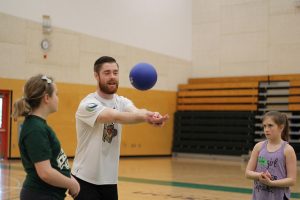
Physical literacy is more than just mastering the movements of sport. It is understanding the fundamentals of what it means to be active, the underlying principles of how we move, and with a competence that will translate into overall healthy development.
Springing into March, Dr. Joanna Sheppard, a UFV kinesiology professor and physical literacy specialist, is engaging her kinesiology students in UFV’s FUNdamentals spring break camp. Organized by UFV Campus Recreation, the camp provides kids age 5 to 13 the opportunity to explore physical activity, build confidence in a social setting, and participate in activities that teach primary movements necessary for survival.
“Children are at an increased risk of non-participation in physical activity. Age 5 to 13 is an important phase in a child’s life to be strengthening movement skills and tactical learning, so they can move forward in their activities,” explains Sheppard.
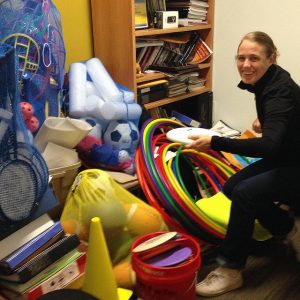
Spearheaded by Sheppard and Cheryl Van Nes, Program Manager for Campus Recreation and Wellness, the camp is double the fun, and double the education for participants and leaders. “Cheryl approached me about creating a camp specific to physical literacy. I knew the only way to deliver the camp would be through experiential learning,” says Sheppard.
By doing so, Sheppard is creating learning opportunities for her students outside the traditional classroom. Kinesiology students are applying their knowledge and conceptual understanding of physical literacy to teach children about movement in real active lifestyle settings.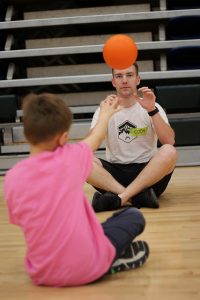
“The camp provides my [kinesiology] students the opportunity to put into practice what they are learning in their pedagogical classrooms into real life,” says Sheppard.
The camp leaders follow a curriculum based on current physical education requirements for the age group. Kinesiology students have the opportunity to teach kids fundamental movement skills, and game play, while connecting their experiences back to what they are learning in class.
“We are focusing on basic physical literacy skills like hopping, skipping, running, jumping, that can be applied to a wide array of day-to-day movements. This isn’t a basketball or soccer camp,” notes Tsandlia van Ry, an upper-level student in the kinesiology program at UFV.
Students from UFV’s Bachelor of Kinesiology program understand the importance of equipping young children with skills that will enable them to engage in activity, value health, and build fundamental movements for life. “We are trying to teach and mentor young children about the importance of learning fundamental movements, and how these movements can lead them to become lifelong movers, and become physically active for the rest of their lives,” says Josh Acheta, an upper-level student in the Kinesiology program at UFV.
As part of their course requirements, Sheppard is engaging Kinesiology students as leaders of the camp to reflect on their experience, skills, and perceptions following the activities; it’s a true experiential learning activity.
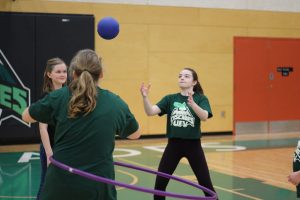 “The reflection piece, and in particular, what they will take away from this experience is fundamental to their learning. I ask them to think about what they are taking away from the knowledge they are gaining, and how can they apply it in their future professional practice,” explains Sheppard.
“The reflection piece, and in particular, what they will take away from this experience is fundamental to their learning. I ask them to think about what they are taking away from the knowledge they are gaining, and how can they apply it in their future professional practice,” explains Sheppard.
The camp gives Kinesiology students the power to use their prior experience working with children, and make connections between the activities and their knowledge of health.
“I’m in the Pedagogy stream of the Kinesiology program at UFV and I want to pursue a career in medicine. I think this camp is an example of the importance of pedagogy in health. This is where health starts. The fundamentals of being physically literate is not just for kids or athletes, it is a part of living an active lifestyle and being confident in using your fundamental movements in everyday activities throughout the rest of your life,” says van Ry.
Not only is Sheppard integrating experiential learning outside the classroom, she is doing so in a way that seeks to promote the health of children in the Fraser Valley.
“This camp gives me and my peers in Kinesiology an opportunity to give back to our communities, and apply the knowledge we’ve been gaining in class with the children in the camp,” says Acheta.
Experiential learning is a top priority for the University of the Fraser Valley. It provides students with the opportunity to see the application of theoretical concepts applied to real-life situations. Learning is created through experience, and Sheppard is leading the way for her students.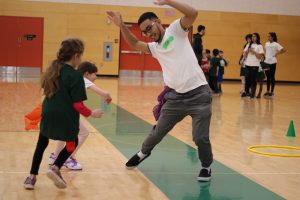
“I’m really grateful for the opportunity Dr. Sheppard has given us. She makes sure to incorporate her Kinesiology students in hands-on learning activities, in areas where most of us would not have the opportunity to participate, such as a movement camp for kids. One of the reasons I chose Kinesiology at UFV was because of professors like Dr. Sheppard. She has really shaped the positive learning experiences I’ve had,” says van Ry.
Experiential learning doesn’t stop here for kinesiology students. Many of the camp’s student leaders will be traveling to Antigua in April for Champions for Health Promoting Schools, a four-week international teaching experience program in the West Indies where Sheppard and her student champions will be teaching the importance of life skills through physical and health education.
To learn more about student opportunities in kinesiology at UFV, visit our website.

